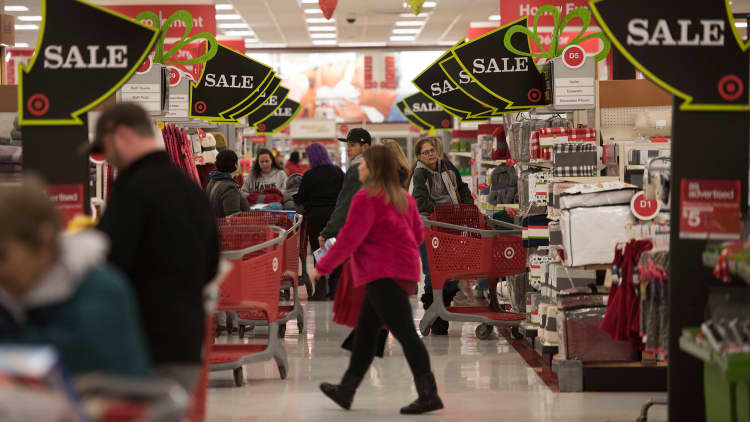
Thousands of Target employees are about to get a raise.
The big-box retailer said Monday it will start raising its minimum wage next month from $10 an hour and will eventually reach $11 for all its U.S. stores.
The pay raise will outpace Wal-Mart's recent increase in its minimum wage. The two retailers have been engaged in a quiet wage war for years.
Target raised its hourly minimum pay rate in April 2015 to $9, up from the federal minimum wage of $7.25 per hour at the time. That move came in response to an announcement by Wal-Mart in February, where Wal-Mart promised to lift its base pay to $10 an hour by 2016.
While Wal-Mart has touted past pay increases, using earnings conference calls to circulate the news, Target has moved more stealthily, only saying earlier this year that it would be investing billions of dollars back into the company.
When asked on a call with media about Target's decision to make Monday's news considerably more public, CEO Brian Cornell said he wants to be "very definitive" and "very declarative" about Target's commitment to, and investment in, its employees.
"Target has always offered market-competitive wages to our team members," Cornell said in a statement. "With this latest commitment, we'll be providing even more meaningful pay, as well as the tools, training, and support ... that set Target apart."
Target also reiterated its sales and earnings outlook for the third quarter and full year. That means the increased salary expenses aren't expected to affect the retailer's bottom line, since Target baked the wage hike into its $7 billion investment plan.
"This is our continued focus of investing in the Target team," said Cornell.
Target said the wage increases will begin in October and will apply to the 100,000 temporary workers that the retailer plans to hire ahead of the holidays. Only two states in the U.S. — Massachusetts and Washington — currently have a minimum wage of $11 per hour. All others fall below that threshold, but many states already have plans in place to further hike pay in the coming years.
Target also committed to boosting its minimum wage to $15 per hour by 2020.
Target has declined to comment on how many of the roughly 323,000 employees at its more than 1,800 stores will be receiving the pay increases. The company has emphasized that it wants to "recruit and retain strong team members."
Many retailers, such as Gap, Ikea, Costco and Whole Foods, have been offering competitive minimum wages despite congressional unwillingness to boost the federal minimum wage — a number that hasn't budged since 2009.
Democrats recently introduced a $15 minimum wage bill, backed by Sen. Bernie Sanders, following the Obama administration's second-term proposal to raise the level to $10.10 an hour, which got no traction in Congress.
President Donald Trump has flirted with the idea of raising the federal base pay to $10 an hour. At a press conference in Florida last year, he told the crowd: "The minimum wage has to go up. ... At least $10, but it has to go up."
For now, states — and individual companies — are left to make their own decisions on whether to raise the bar.


